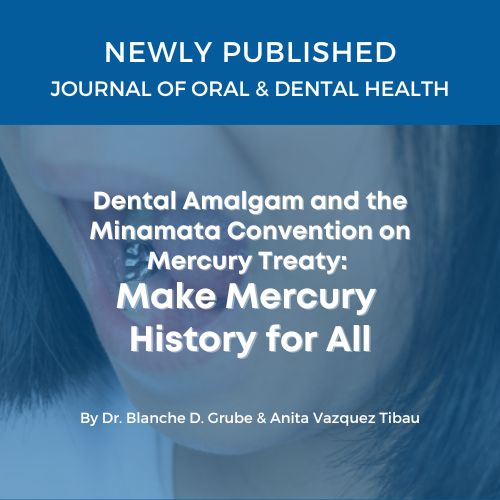Press Release - Mercury in the News

The Latest Scientific Review Research on Mercury Dental Amalgam & the Global Movement to “Make Mercury History for All”
Dental Amalgam and the Minamata Convention on Mercury Treaty: Make Mercury History for All by Dr. Blanche D. Grube and Anita Vazquez Tibau
Read Full Article HERE.
Abstract
Mercury, known as the most toxic non-radioactive element to man, poses a significant threat to all living beings and the environment in all its forms. As a global pollutant, it demands urgent attention and effective measures to mitigate its toxic effects.
The Minamata Convention on Mercury Treaty, adopted in 2013 and enforced in 2017, stands as a vital instrument in combating this pervasive toxin. Presently, 144 countries have ratified the treaty, embodying the collective commitment to the mantra “Make Mercury History.”
As countries work diligently to eliminate mercury from various products and processes, such as thermometers, batteries, lighting, and cosmetics, dental amalgam remains a notable concern. Being one of the top mercury-containing products globally, dental amalgam has drawn attention for its phasedown approach within the treaty.
The dental sector alone accounts for an estimated 340 tonnes of mercury usage each year. Alarmingly, mercury derived from dental amalgam infiltrates the black market, ultimately entering the artisanal small-scale gold mining (ASGM) sector, the primary source of global mercury pollution.
Furthermore, dental amalgam plays a significant role in municipal wastewater mercury contamination, as it has been identified as the largest source of this toxic element in such environments. Considering its pervasive nature, diverse pathways of contamination, and its ability to bioaccumulate in both humans and the environment, it is evident that the toxic legacy of dental amalgam will persist long after the placement of the last amalgam filling.
The pressing issue of mercury toxicity makes it imperative for action to be taken through the Minamata Convention on Mercury Treaty. As we strive to “Make Mercury History” for the well-being of all living organisms, mercury dental amalgam must be proactively addressed to prevent its continued contribution to global mercury pollution.
